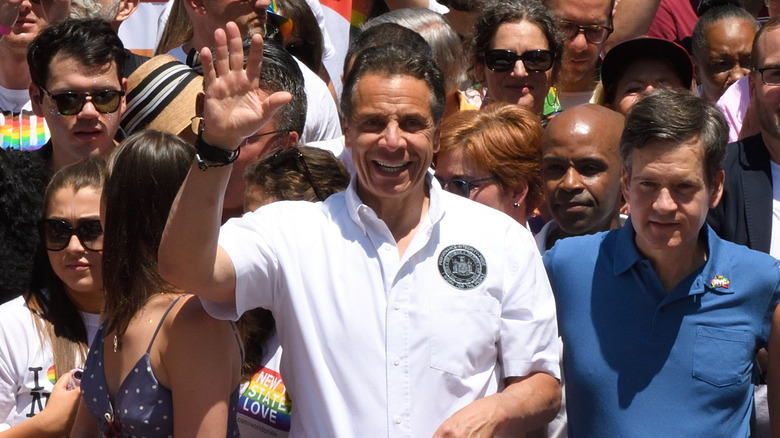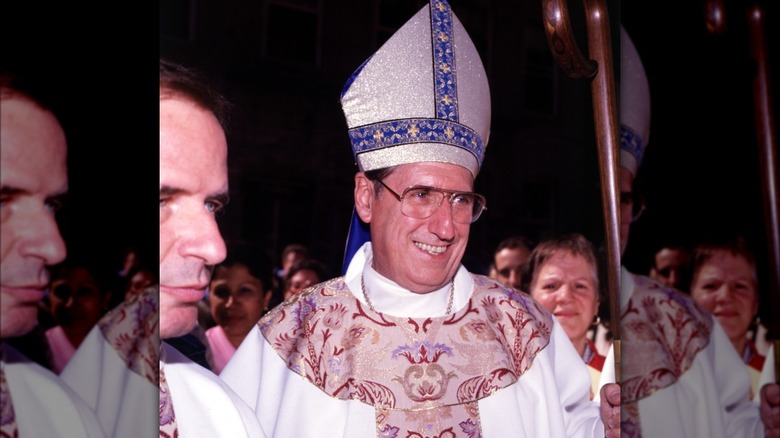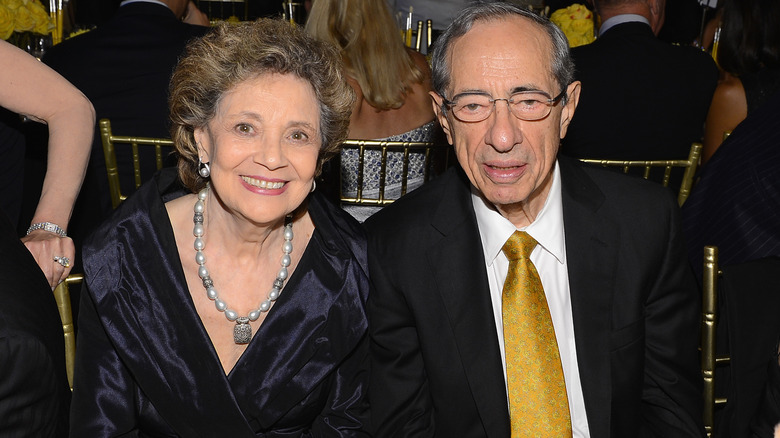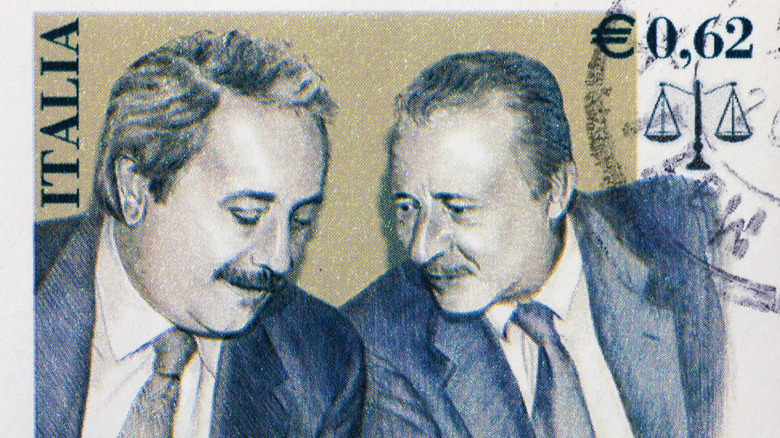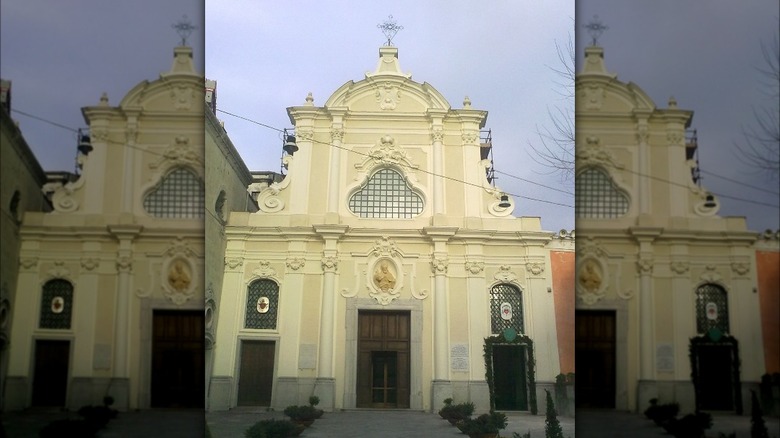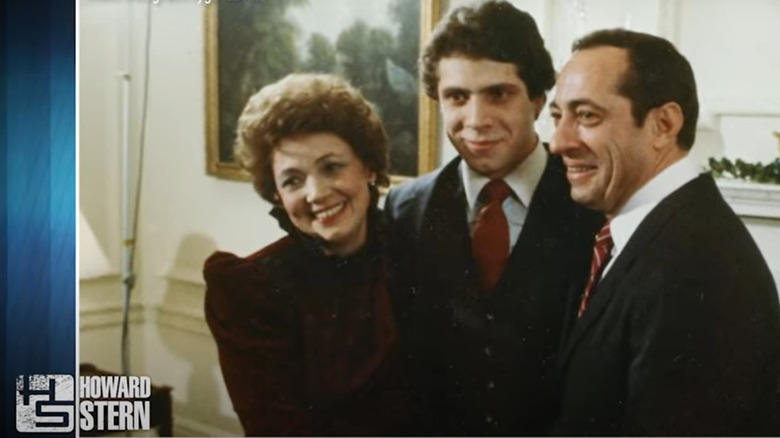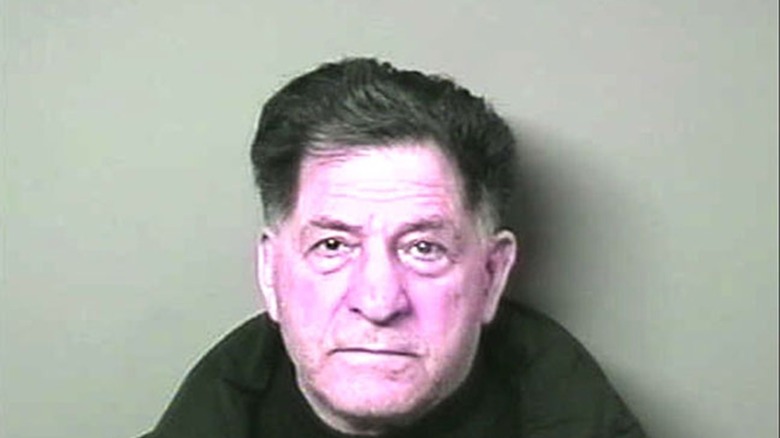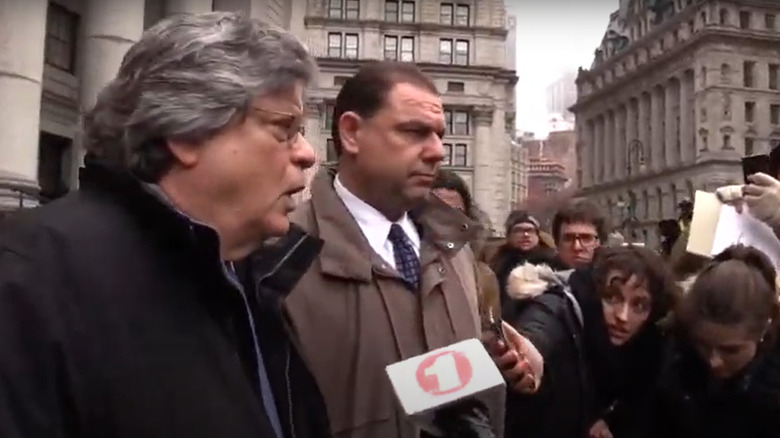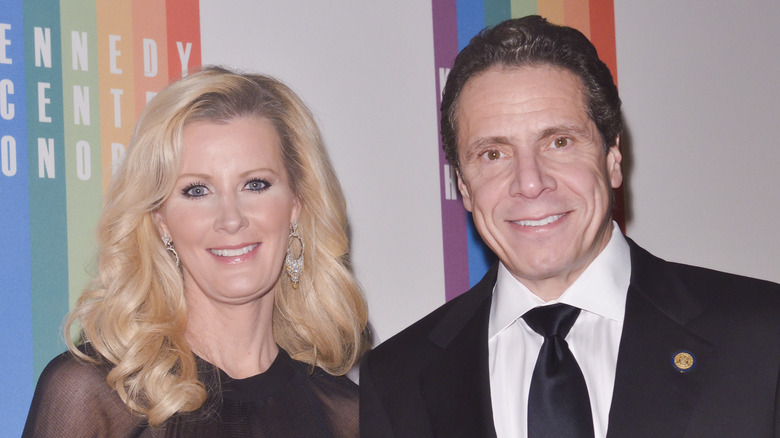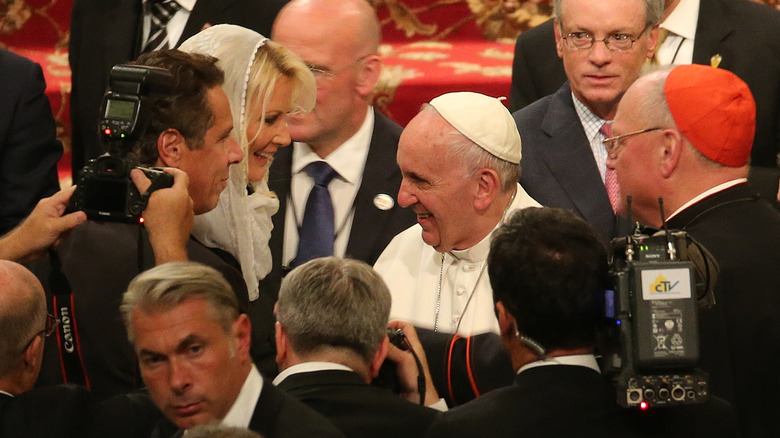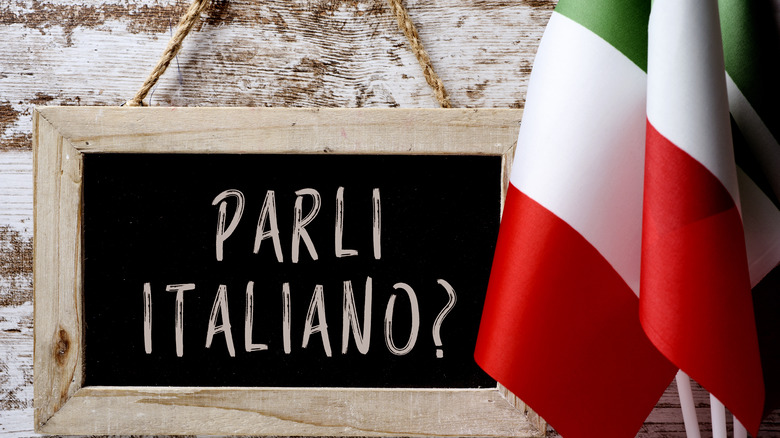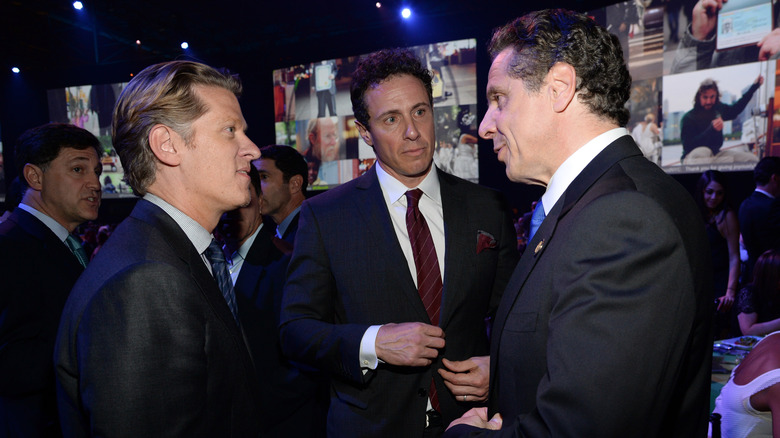The Untold Truth Of The Cuomo Family
The Cuomo family is legendary in New York political circles, providing the state with two governors. But today, it seems this dynasty may face an unforeseen downfall. Governor Andrew Cuomo, accused by conservative critics and mobsters alike of being a mass murderer over his handling of COVID-19 in nursing homes, has resigned in the face of a sexual harassment scandal. His brother Chris has lost his job at CNN over an alleged coverup on his brother's behalf, which involved digging up dirt on his brother's accusers.
So how did it come to this? Despite the Cuomo family's humble beginnings, political ambition has been a key part of the lives of the men, whereas the women have kept a lower profile. While this ambition may have catapulted Mario Cuomo to political stardom, their politics, which have informed nearly every single aspect of their public and private lives, ultimately may cost the dynasty its future. Here is the untold story of the rise and fall of the Cuomo family.
Mario Cuomo: baseball star
Mario Cuomo (pictured above throwing a first pitch in Buffalo) was born to an Italian American family in Briarwood, Queens, at the time an Italian and Jewish neighborhood. Like many American children, he dreamed of becoming a professional baseball player, perhaps even making it to the MLB. According to the American Society for Baseball Research, Cuomo said that the children of New York's working-class immigrant neighborhoods often played baseball in sandlots. There were "baseball fields" created out of whatever available space they could find, including streets, parking lots, or green areas in the park.
Although he was a skilled baseball player, Cuomo adopted an academics-first approach to education. According to the MLB, he did not view himself as "good enough" to be a major leaguer and knew that chances for a professional contract were slim for even the most skilled. But he did get the opportunity to at least try. He played at St. John's University and then signed with the Pittsburgh Pirates in 1952, who sent him to play for their Minor League affiliate in Georgia, the Brunswick Pirates. HIs .244 batting average would be considered below average today. Although it was not his childhood Major League dream, he could at least brag that he "went pro" and even had a baseball card to prove it (the card was made much later). His future lay in politics and law, which would soon force him to compromise on his religious tenets and send him on a collision course with the Catholic Church.
Problems with the Church
New York City has been one of Catholic America's most powerful and influential centers since the Irish immigration of the mid-19th century. New York politicians generally have to play ball with the Archdiocese of New York, whose faith historically aligned with the Democratic Party, per Cardinal Timothy Dolan. But in the 1970s and '80s, the problem of legal abortion split the Catholic Democrats.
New York's 1970 legalization of abortion created a dilemma for Catholic Democrats. In liberal New York City, opposition to legalized abortion was career suicide. According to The Catholic Thing, Mario Cuomo's losses in the lieutenant governor and New York City mayoral races in 1973 and 1977 respectively stemmed in part from opposition to abortion. Thus, he adopted the "familiar line" that although he personally disagreed with abortion, he could not deprive non-believers of their access to one.
This stance, however, brought him into direct conflict with the Catholic Church. Archbishop John O'Connor of New York reminded the newly minted governor in 1984 that abortion was willful murder regardless of religion. Under Canon 915 of the Catechism of the Catholic Church Catholic, which had been adopted one year earlier, pro-abortion politicians such as Cuomo were explicitly banned from communion. Cuomo countered the archbishop in several speeches over the course of his career. Ultimately, much like the later Geraldine Ferraro, Cuomo chose his politics over Canon Law, despite O'Connor's warnings that there was no room for compromise on the issue. Otherwise, Cuomo claimed, his opponents would have drawn and quartered him politically.
A baseball nearly ended Mario Cuomo's 60-year marriage – before it began
Although Mario Cuomo clashed with the Catholic establishment over abortion, no one can say that he did not take the Catholic Church's teaching on marriage as a permanent bond seriously. Cuomo was married to his wife Matilda for 60 years. But this love story was nearly ended in its infancy by a rogue baseball while Cuomo was living in Georgia.
Cuomo met his wife in the St. John's University cafeteria. According to the New York Daily News, he was studying to be a lawyer, and she was pursuing a teaching degree. But they endured a period of separation when he went to play ball in Georgia. During this time, he wrote her frequently, and she eagerly anticipated the arrival of his letters. Small wonder, then, that she believed he had lost interest in her after he failed to write to her for two weeks.
Matilda claimed to have decided she "never wanted to see that guy again." He was dead to her. But Cuomo had a reason for his prolonged silence. According to ESPN, pro baseball players were not required to wear helmets until 1971. So during a game, according to Cuomo himself (via MiLB), he got smacked in the back of the head with a 100 mph throw that hospitalized him and left him blind for a time. It also ended his chances of a baseball career. His wife-to-be took him back. Using leftovers from his $2,000 signing bonus from the Pittsburgh Pirates, he bought her a ring and proposed. They married in 1954.
Mario Cuomo almost got whacked
According to the New York Times, Mario Cuomo did not believe in the mob. Or so he claimed, calling the idea of Italian organized crime "a lot of baloney." But the mob was real, and, at one point, it even sought to kill the governor when he visited Italy in 1992. According to former Cosa Nostra hitman Maurizio Avola (via The Guardian), organized crime planned to whack the governor, despite having no beef with him. Avola told The Guardian that Cosa Nostra had wanted to send signals to both Italian and American justice to stop investigating the mob. It had already whacked anti-mafia Italian prosecutors Giovanni Falcone and Aldo Borsellino in 1992 (pictured above), so now it needed to intimidate the American justice system, which sheltered mafia turncoats in the U.S. Cuomo's fame made him a perfect target, despite his public denials of the mafia's existence.
Originally, Avola's boss Aldo Ercolano hoped to kill Cuomo upon learning about his trip to Rome, but he settled on the Sicilian city of Messina instead. The plan was simple. The assassins would spray the governor and his detail with automatic gunfire and then blow up the motorcade. But when Cuomo arrived in Rome with a massive security detail, Ercolano pulled back. Is this true? The magistrate in Sicily's capital Palermo refused to give any details, so the story's veracity is unclear. But Avola's gruesome resume, which includes 43 murders and 40 robberies, suggests that he could be telling the truth. He has little to lose, since, as of 2021, he is serving a life sentence for his crimes.
The favorite Cuomo
Who is the favorite Cuomo? One might think that this refers to Mario and Matilda's children, but this is actually a reference to a 1983 New York Times headline about Mario's Italian fame. Older Italian American politicians often still have close immediate family back in Italy. Mario Cuomo was no exception. His grandfather was born in the village of Nocera (pictured above) in the Campania region of Southern Italy, and his father lived there for a time. Naturally, in such small villages, there were many people with the surname Cuomo who were all related to each other. Among them were his father's siblings and numerous cousins. When Mario won the governorship of New York in 1983, suddenly, everyone became a close relative.
According to the New York Times, Mario's first cousin Renato Cuomo declared himself the "arbiter" of all things Cuomo, deciding which relatives were allowed to flaunt their connections to the new governor and who was too distant a relative. There were even people who were not surnamed Cuomo who tried to dig out relations, however tenuous, to the governor, who was seen as a success story for this seemingly-insignificant little town. In his mother's village, a nearby town called Tramonit, Cuomo was made an honorary citizen. But, the fame of the favorite Cuomo was not a one-way street, according to Tramonti priest Fr. Luca Giordano. He had hoped that the governor would contribute some money to alleviate the region's problems of unemployment and poverty and rebuild the town church that had been shattered in an earthquake. It does not seem he ever gave any money.
Father and son
Mario and Matilda Cuomo had five children, one of which is the recently-disgraced governor of New York, Andrew "the King of New York" Cuomo. According to the New Yorker, Cuomo has acquired a reputation as a tyrant of sorts, particularly from conservative opponents of New York's COVID-19 lockdown measures in 2020. According to Politico, fellow democrats have also accused him of tyrannically abusing his power to sexually harass his aides. But this reputation is nothing new. Andrew already was known for his ruthlessness when he served in his father's administration as an enforcer of sorts.
According to a Washington Post opinion column, Andrew developed this personality as part of the political interplay with his father. His father was always known as a jovial, get-along type of politician who was on friendly terms with everyone in Albany. Andrew, however, was the "dark force" behind the throne. He did all the dirty work, arm-twisting New York's legislators into supporting his father's political agendas. So while his father maintained the liberal image of the "high-minded priest of public morality," Andrew accomplished everything by "slashing and bullying." He was not subtle about it either. As the New Republic notes, there was "no poetry" in Andrew Cuomo, who preferred wielding naked authority to the flowery campaign and softer governing styles of his father.
Allegations of mob ties
In 1987, New York Magazine reported that a woman asked Mario Cuomo to run for president despite allegations of Cuomo mob involvement. Such allegations followed New York Italian American politicians such as Cuomo. New York Magazine has rejected the rumors as false, tracing them back to Cuomo's encounter with Colombo mobster and later federal informant Sonny Franzese (pictured above) at a wedding.
Cuomo found the allegations offensive. The Washington Post noted that he publicly disavowed the existence of the powerful Cosa Nostra mob, calling it a bunch of "baloney" created to criminalize Italian Americans. But this was the same defense that mobsters under federal surveillance — such as Joe Colombo – used, so there is always the possibility Mario was trying to misdirect critics. After all, Cosa Nostra had been a documented reality in both Italy and the United States since the 19th century, so it seems unlikely that his denial of its existence was genuine.
While the Cuomos themselves have no proven ties, some of their close allies have. In 2020, NBC reported that James Cahill, a major player in NYC's powerful construction unions and ally of Governor Andrew Cuomo, was indicted for corruption, violence, and intimidation with Serbian and Italian gangsters. Cahill never hid his mob ties. He referred to himself as "the last of the 'Westies,'" a violent Irish American syndicate out of NYC's Hell's Kitchen neighborhood. It is unlikely that former governor Andrew Cuomo could not have known about his ally's connections, but again, nothing has been proven yet.
The 'third son'
Mario and Matilda Cuomo had two sons, Chris and Andrew. But according to Andrew Cuomo himself, as quoted in the Buffalo News, Mario had a "third son" named John Percoco (pictured above with a lawyer), whom Andrew claimed that his father "loved the most." Percoco was the favorite of D.C. lobbyist Todd Howe, the man responsible for bringing him to Albany in 1991, and he had served as Mario and Andrew's confidant and enforcer throughout their administrations. But Percoco became involved in a corruption scandal that threatened to implicate Andrew and the rest of the family due to their closeness.
Percoco was to Andrew what Andrew was to Mario. Andrew's role as governor was to cajole legislators into advancing his legislative agenda. Percoco would then play the "good cop" role to win over the legislators and "put out fires" that his boss had lit. For Percoco, he did not see it as serving a boss, but serving his second family. But despite his taxpayer-funded job, he got greedy and, according to the Cuomo family, betrayed their and the public's trust. According to Gothamist, Percoco accepted over $300,000 in bribes from two firms seeking to advance their interests in New York. He left behind his wife and children and was hit with six years in federal prison.
The myth of Cuomolot
According to Vanity Fair, Andrew Cuomo was once married to wealthy heiress Kerry Kennedy, the daughter of Robert Kennedy and niece of former president John F. Kennedy. This marriage between the established American Kennedy dynasty and the up-and-coming Cuomo family was billed as the creation of Cuomolot, as their estate in upstate New York came to be called. But there was more than just love behind this failed marriage.
Kerry Kennedy was not meant to marry Andrew. The man she had intended to marry, a fellow undergraduate from Brown, had died unexpectedly of a heart attack during a snowball fight. The Kennedy family was less than impressed with Andrew, the new boyfriend, when she first brought him home. Andrew seemed like a status-seeking social climber, for whom every action, including the marriage to a Kennedy, was calculated to benefit his political career. The fact that the Kenendy family had once been Catholic nouveau-riche newcomers in Boston's WASP elite (via "The Guardian") was lost on them. The close-knit Cuomo family was not particularly fond of Kerry either, and one insider claimed that they only "[tried] to be supportive."
Nevertheless, they were married in St. Matthew's Cathedral in Washington, D.C., where JFK had married Jackie. Finding the comparisons irresistible, the press coined the term Cuomolot, imagining the joining of two political dynasties with all the pomp and ceremony of a European royal wedding. But Andrew's obsession with his political career and his strained relations with his wife's family proved too much, and the fairy-tale façade collapsed following their 2002 divorce.
Andrew Cuomo's complicated relationship with religion
In the same way Andrew Cuomo's marriage took the back seat to his political career, the National Catholic Register has noted that he has treated his religion the same way. For instance, the Daily Mail reported that Cuomo refused to marry his live-in girlfriend Sandra Lee, claiming (correctly) that as a Catholic, he could not remarry. According to the USCCB, civilly divorced Catholics have previous marriages annulled to remarry. But this did not stop the pair from adulterous dating (from a Catholic perspective) or cohabiting, which, per Catholic News Agency, is a serious sin. Thus, Cuomo's Catholicism was calculated, because like his father, he ran afoul Canon 915.
Following in his father's footsteps in the face of Catholic opposition, Andrew Cuomo signed the Reproductive Health Act in 2019, legalizing abortions in New York after 24 weeks if there are risks to the mother's health or life. Fox News reported that numerous critics had accused the bill of legalizing abortion to the point of birth, although as a USA Today fact-check noted, the law does not explicitly say that. Cuomo's flagrant violation of Church teachings has split Catholics. Although some have defended him, many more have called for his official excommunication from the Catholic Church. Regardless of the bishops' actions, Cuomo is already barred from taking communion anyway. He would have to openly disavow his support for abortion to return to the church's good graces.
Margaret Cuomo: Preserving Italian in America
While the Cuomo men have been ensnared in numerous political and religious scandals, the Cuomo women have maintained a relatively low profile. But Margaret Cuomo has found her own way to contribute to America's cultural and scholarly fabric with her support for the Italian language in America. Margaret is one of the founding members of the Italian Language Foundation (ILF), which seeks to promote Italian language study in the United States through the Collegeboard's AP program. The foundation has received support from NGOs and the Italian government alike.
The foundation gives its raison d'etre as the elimination of AP Italian from the curriculum in 2008. But that is likely just a symptom of a larger problem, namely the decline of the Italian language in America. According to Fortune Magazine, Italian, once regularly spoken in America's major cities, most famously New York and Boston, has lost nearly half its American speakers between 2001 and 2017. It constitutes America's fastest-declining language, in line with declining Italian immigration to the United States. But the ILF is fighting this decline. The ILF notes that Italian is a fundamental language to the creation of the Western world and also has immense importance as a heritage language. Thus, Margaret Cuomo, who herself has cultural interests in the language's preservation, has opted out of politics to ensure that her family's ancestral tongue, once heard all over the streets of the eastern cities, is not lost to the forces of assimilation.
'Somewhere between a father and a brother'
Chris Cuomo is Mario and Matilda's youngest son, and he was, until very recently, a well-known face on America's corporate television news as a CNN anchor. But less is known about his upbringing, which his brother Andrew claims was a little complicated from a family perspective. According to ET, Chris (born 1970) came along at a time when his father was beginning his political career, and he came of age at its height. Thus, according to Andrew, Chris did not see his father much, since he was occupied with his job as governor. Chris was "left at home" while his brother and father masterminded their way to New York's highest political position.
But Andrew claims that he did not allow his brother to be neglected. Feeling bad for his brother, he balanced his life as his father's campaign manager with being "somewhere between a father and a brother" for Chris. Thus, they had a close relationship, which has come out during some of their less serious moments on CNN. This relationship might explain why Chris was willing to violate journalistic standards (via NPR) by digging up dirt on his brother's sexual harassment accusers, which has in part led to the loss of his CNN job.
